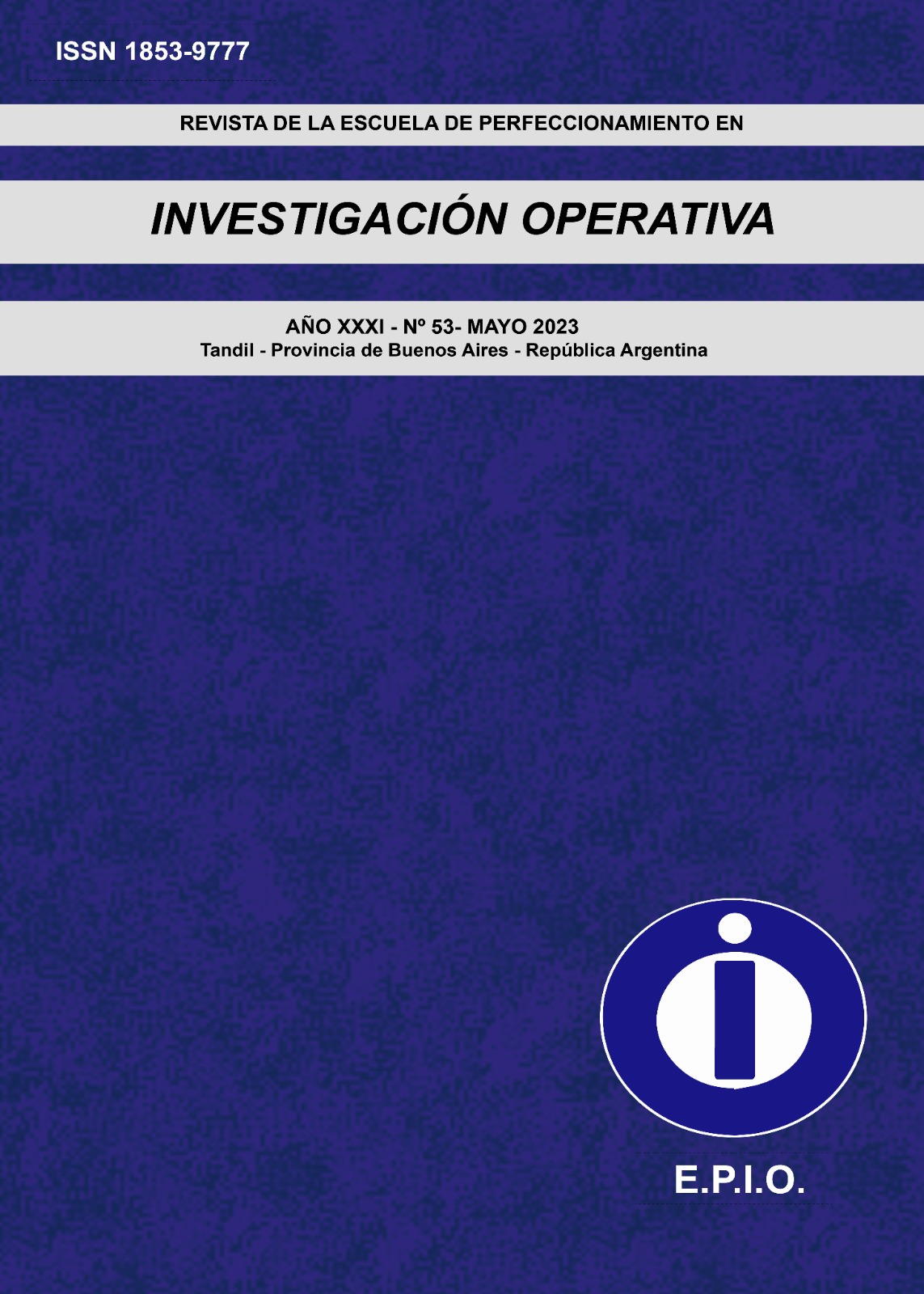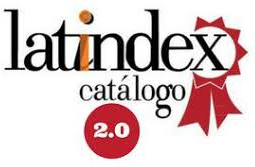Finding kernel in group decision-making
Palabras clave:
ELECTRE I, DRV Processes, Kernel, Group decision makingResumen
A methodological combination of the DRV Processes and the ELECTRE I method is proposed to obtain a kernel solution and consensus-building. DRV processes include three phases: stabilization, aggregation, and ordering. The first phase concerns problem structuring, preferences evaluating so that the forms of ignorance of information are controlled and the consensus is favored. Aggregation phase was originally carried out with linear weighting, a strategy that allows us to obtain an ordering or the selection of the best alternative. Solutions to problems that seek to discriminate a kernel set are not formalized. A methodological combination is formalised to find kernel solutions in group decision making and we show an application case in which we obtained the set of good alternatives. The results show that the bias of underestimating good points with low importance is reduced using outranking methods in the aggregation and ordering phases.
ARK CAICYT: http://id.caicyt.gov.ar/ark:/s18539777/9wff460bf
Descargas
Referencias
Autran Monteiro Gomes, L.F.A.M., González, M.C.A., Carignano, C., (2004). Tomada de decisões em cenários complexos: introdução aos métodos discretos do apoio multicritério à decisão. Thompson.
Belton, V., Stewart, T., (2010). Problem structuring and multiple criteria decision analysis in: Trends in multiple criteria decision analysis. Springer, 209–239.
Benjamini, Y., Yekutieli, D., (2001). The control of the false discovery rate in multiple testing under dependency. Annals of statistics, 1165–1188. Publisher: JSTOR.
Castellini, M.A., Zanazzi, J.L., Cabrera, G.P., (2017). Selecting Working Teams For Information Technology Outsourcing Projects Through A Combination Of Methodologies. Pesquisa Operacional, vol. 37, 67–92. Publisher: SciELO Brasil.
Corrente, S., Figueira, J.R., Greco, S., (2014). The Smaa-Promethee method. European Journal of Operational Research vol. 239, 514–522. Publisher: Elsevier.
Ervural, B.C., Ervural, B., Kabak, O., (2016). A group decision making approach for the evaluation of flexible manufacturing systems. IFAC-PapersOnLine 49, 1329–1334. Publisher: Elsevier.
Figueira, J., Mousseau, V., Roy, B., (2005). ELECTRE methods, in: Multiple criteria decision analysis: State of the art surveys. Springer, 133–153.
Figueira, J.R., Greco, S., Roy, B., SLowiński, R., (2010). ELECTRE methods: main features and recent developments, in: Handbook of multicriteria analysis. Springer, 51–89.
Fu, C., Yang, S., (2012). An evidential reasoning based consensus model for multiple attribute group decision analysis problems with interval-valued group consensus requirements. European Journal of Operational Research vol. 223, 167– 176. Publisher: Elsevier.
Galo, N.R., Calache, L.D.D.R., Carpinetti, L.C.R., (2018). A group decision approach for supplier categorization based on hesitant fuzzy and ELECTRE TRI. International Journal of Production Economics vol. 202, 182–196. Publisher: Elsevier.
Govindan, K., Jepsen, M.B., (2016). ELECTRE: A Comprehensive Literature Review On Methodologies And Applications. European Journal of Operational Research 250, 1–29. Publisher: Elsevier.
Hwang, C.L., Lin, M.J., (1987). Group decision making under multiple criteria. volume 281.
Hämäläinen, R.P., Lahtinen, T.J., (2016). Path dependence in operational research—how the modeling process can influence the results. Operations research perspectives vol 3, 14–20. Publisher: Elsevier.
Jiao, L., Pan, Q., Liang, Y., Feng, X., Yang, F., (2016). Combining sources of evidence with reliability and importance for decision making. Central European Journal of Operations Research vol. 24, 87–106. Publisher: Springer.
Kabak, O., Ervural, B., (2017). Multiple Attribute Group Decision Making: A Generic Conceptual Framework And A Classification Scheme. Knowledge-Based Systems vol. 123, 13–30. Publisher: Elsevier.
Koksalmis, E., Kabak, O., (2019). Deriving decision makers’ weights in group decision making: an overview of objective methods. Information Fusion vol. 49, 146–160. Publisher: Elsevier.
Kotlar, J., De Massis, A., Wright, M., Frattini, F., (2018). Organizational goals: antecedents, formation processes and implications for firm behavior and performance. International Journal of Management Reviews vol. 20, S3–S18. Publisher: Wiley Online Library.
Marttunen, M., Lienert, J., Belton, V., (2017). Structuring problems for multicriteria decision analysis in practice: a literature review of method combinations. European Journal of Operational Research vol. 263, 1–17. Publisher: Elsevier.
Merigó, J.M., Gil-Lafuente, A.M., (2011). Fuzzy induced generalized aggregation operators and its application in multi-person decision making. Expert Systems with Applications vol. 38, 9761–9772. Publisher: Elsevier.
Munda, G., (1993). Multiple-Criteria decision aid: some epistemological considerations. Journal of Multi-Criteria Decision Analysis vol. 2, 41–55. Publisher: Wiley Online Library.
Munda, G., (2004). Social multi-criteria evaluation: methodological foundations and operational consequences. European journal of operational research vol 158, 662–677. Publisher: Elsevier.
Rahman, M.M., Govindarajulu, Z., (1997). A modification of the test of Shapiro And Wilk for normality. Journal of Applied Statistics vol. 24, 219–236. Publisher: Taylor & Francis.
Roy, B., (1985). Méthodologie multicritère d’aide à la décision,. volume 138 of Collection Gestion, Série Production et techniques quantitatives appliquées à la gestion. Editions Economica, Giard Vincent Editeur, Parı́s.
Roy, B., Figueira, J., Almeida-Dias, J., (2014). Discriminating thresholds as a tool to cope with imperfect knowledge in multiple criteria decision aiding: theoretical results and practical issues. Omega vol. 43, 9–20. Publisher: Elsevier.
Smets, P., (1991). Varieties of ignorance and the need for well-founded theories. Information Sciences vol. 57, 135–144. Publisher: Elsevier.
Tervonen, T., Figueira, J., Lahdelma, R., Salminen, P., (2008). Smaa-Iii, In: Real-Time And Deliberative Decision Making. Springer, 241–253.
Tzeng, G.H., Huang, J.J., (2011). Multiple attribute decision making: methods and applications. CRC press.
Velasquez, M., Hester, P.T., (2013). An Analysis Of Multi-Criteria Decision Making Methods. International journal of operations research vol. 10, 56–66.
Velez-Castiblanco, J., Brocklesby, J., Midgley, G., (2016). Boundary games: how teams of or practitioners explore the boundaries of intervention. European Journal of Operational Research vol. 249, 968–982. Publisher: Elsevier.
Wenger-Trayner, E., Fenton-O’creevy, M., Hutchinson, S., Kubiak, C., Wenger- Trayner, B., (2014). Learning in landscapes of practice: boundaries, identity, and knowledgeability in practice-based learning. Routledge.
Zanazzi, J.L., (2016). Toma de decisiones en grupos de trabajo. El método Procesos DRV. Ph.D. thesis. Universidad Nacional de Córdoba.
Zanazzi, J.L., Gomes, L.F.A.M., Dimitroff, M., 2014. Group decision making applied to preventive maintenance systems. Pesquisa Operacional vol. 34, 91–105.
Descargas
Publicado
Número
Sección
Licencia

Esta obra está bajo una licencia internacional Creative Commons Atribución-NoComercial-CompartirIgual 4.0.
Atribución — Usted debe dar crédito de manera adecuada, brindar un enlace a la licencia, e indicar si se han realizado cambios. Puede hacerlo en cualquier forma razonable, pero no de forma tal que sugiera que usted o su uso tienen el apoyo de la licenciante.
NoComercial — Usted no puede hacer uso del material con propósitos comerciales.
CompartirIgual — Si remezcla, transforma o crea a partir del material, debe distribuir su contribución bajo la misma licencia del original.







